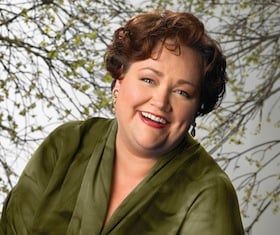
Music lovers expecting the ordinary at Stephanie Blythe’s vocal recital Thursday evening at Herbst Theatre received several splendid surprises. Presented by San Francisco Performances, the great mezzo-soprano defied expectations at every turn, and the results were nothing short of brilliant.
Accompanied by the pianist Warren Jones, Blythe sang a program of American works that began with James Legg’s settings of Emily Dickinson texts, continued with Samuel Barber’s Three Songs, Op. 10, and reached back over a century to the songs of Tin Pan Alley. The connection between vocal command, historical insight, dramatic flair, and inspired advocacy has rarely been so clearly drawn.
Blythe has made a strong impression in her past Bay Area appearances, in the role of Azucena in Il Trovatore at San Francisco Opera a few seasons back, and, most recently, in a stunning performance as Dido in the Mark Morris Dance Group’s Dido and Aeneas at Cal Performances last month.
Still, Thursday’s appearance — which marked Blythe’s Bay Area recital debut, and launched San Francisco Performances’ 32nd season — was something special. Blythe’s affinity for American music yielded a rewarding program, and she established an immediate connection between the music and her audience — a link that grew in strength throughout the evening as Blythe delved deeper into her chosen repertoire.
Blythe’s remarkable vocal gifts have never been in doubt — her large, voluptuous tone; unerring pitch; and pinpoint articulation make her one in a million. But she’s also an uncommonly generous, communicative performer, one with an extraordinary ability to express the essence of music and text.
In Legg’s Twelve Poems of Emily Dickinson, that ability yielded a richly musical, subtly enveloping performance. Legg’s settings — the American composer’s final completed works — begin with There’s been a Death, in the Opposite House and conclude with ’Tis not that Dying hurts us so. Written specifically for Blythe, the cycle draws on an entirely different, somewhat darker, collection of Dickinson poems than those Aaron Copland employed in his iconic 1950 Dickinson settings; the vocal writing is aptly luxuriant, the piano parts spare and effective.
Blythe started the performance by announcing that she prefers not to distribute texts when she’s singing in English — “I love the tops of your heads,” she said, “but your eyes are so much more engaging” — and, in an unusual step, she and Jones alternated in reading all twelve poems before performing the cycle. She delivered both beautifully, although her singing — vigorous and expressive, with crisp, clear diction — made the readings rather superfluous. Blythe has a wonderful gift for coloring sung text – in “I’m Nobody! Who are you?,” her emphasis on the words “How public” spoke volumes — and the performance gathered in feeling to its conclusion. “I meant to find Her when I came” was the highlight, with Blythe’s soft, lovely tone floating over Jones’ elegiac piano part.
Barber’s Three Songs followed. The composer’s settings of James Joyce’s 1907 Chamber Music offered Blythe even greater opportunities for theatrical flair; in the first two songs, Rain Has Fallen and Sleep Now, the singer employed golden, rounded tone and eloquent phrasing. But nothing quite prepared the listener for the final song, I hear an army charging upon the land. Here, Barber’s setting of Joyce’s text — a terrifying vision of mad charioteers and whipped horses — conjures a vibrant scene, and Blythe’s performance, sung over Jones’ galloping piano part, lent it operatic intensity.
If the program’s second half represented a slight atmospheric relaxation, Blythe’s musical acuity remained just as keen. Singing a collection of American songs from Tin Pan Alley, the singer exuded wit and charm; the best-known selection was Irving Berlin’s What’ll I Do?, sung with creamy tone and palpable yearning. She made an equally persuasive case for Berlin’s If you Don’t Want my Peaches, You’d be Surprised and I Love a Piano, as well as lesser-known gems such as Ask Her While the Band is Playing by Victor Herbert and Glen MacDonough, After You’ve Gone (Creamer and Tlayton), If I had a Talking Picture of You (Henderson, Brown and DeSylva) and Coax Me (Sterling and Von Tilzer). Jones contributed a pair of Scott Joplin rags, and returned to start the encores with the composer’s Maple Leaf Rag. Blythe’s encores continued the American theme, with expansive performances of Robert Lowry’s How Can I Keep from Singing and Stephen Foster’s Beautiful Dreamer. Any lingering doubts about Blythe’s ability to sustain interest in her all-American program were put to rest by then.

